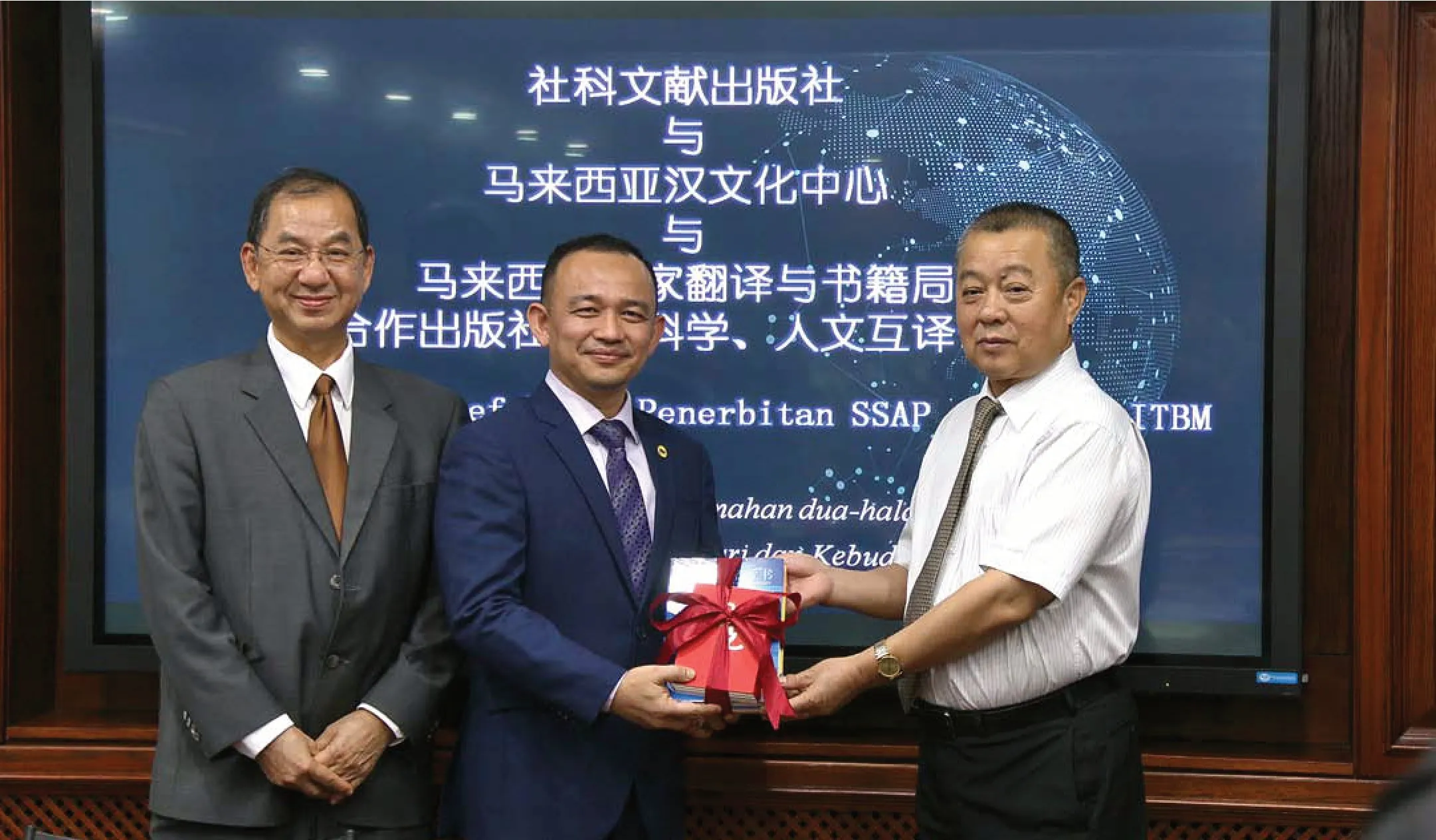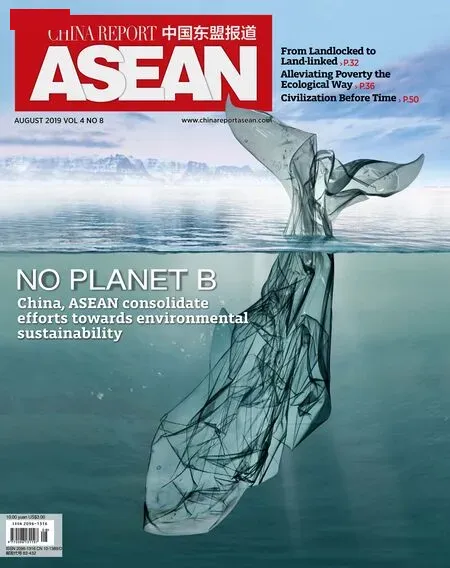THE BOOK ON CULTURAL EXCHANGE A Chinese-Malaysian publishing MoU sets the stage for extensive cooperation
By Yuan Yanan
“I have remained fully committed to the goal of transforming Malaysia into a ‘reading nation' since taking office, and the initiative has received strong support nationwide,” remarked Malaysian Minister of Education Maszlee Malik at the signing ceremony of a memorandum of understanding (MoU) between Chinese and Malaysian organizations on joint academic publishing and educational exchange.
The trilateral agreement was signed by China's Social Sciences Academic Press (SSAP), Malaysia Han Culture Center and Malaysian Institute of Translation and Books in Beijing on July 9. A sign of substantial progress in Sino-Malaysian cooperation in the book industry, the three-way collaboration will help promote academic and educational exchange as well as mutual understanding between the two countries.
The SSAP is an ideal partner for Malaysia to enhance communication and cooperation with China in publishing, translation and exchange of scholarship, according to Maszlee. Co-publishing academic works will not only strengthen bilateral exchange in the fields of literature and education, but also boost interaction between Chinese and Malaysian civilizations, lifting Sino-Malaysian relations into a new realm.
Building a ‘Reading Nation'
To make Malaysia a “reading nation,” the country's Ministry of Education is planning to officially launch a National Reading Decade starting in 2021, aiming to raise the average time spent on reading by Malaysians to at least 12 hours per week by 2030 and increase titles published nationwide to over 30,000 per year from less than 20,000 in 2018.
According to the program, concrete measures will be implemented to foster a reading culture in Malaysia. To provide locals easy access to books, reading rooms and libraries will be placed in strategic places throughout the country including schools, higher education institutions, shopping malls, restaurants, public transport sites, community centers and hospitals.
Malaysia's efforts to build a “reading nation” have already paid off. In 2018, its capital Kuala Lumpur was named World Book Capital for 2020 by the United Nations Educational, Scientific and Cultural Organization (UNESCO).
Kuala Lumpur was selected because of its strong focus on inclusive education, development of a knowledgebased society and accessible reading for all segments of the city's population, according to UNESCO. Among other policies aiming to cultivate a culture of reading and inclusiveness, the city has incorporated the World Book Capital campaign into its urban development planning Vision 2020 for Kuala Lumpur and an eco-city project called the River of Life, which is planning open-air bookstores and libraries for the newly-restored waterways of the city.
To promote Malaysian culture at the global level, the country's Ministry of Education is beginning to translate masterpieces of Malaysian literature into foreign languages.
New Opportunities
Malaysia's vigorous attempts to foster a reading culture are creating new opportunities for cooperation with China in the publishing industry while injecting new impetus into academic and cultural exchange between the two countries. In collaboration with Malaysian partners, Chinese publishers have been enthusiastic about presenting foreign readers an array of brilliant Chinese literary works.

SSAP President Xie Shouguang (right) presents books to Malaysian Minister of Education Maszlee Malik (center) at the signing ceremony in Beijing on July 9.
This April, a promotional event for 15 books sponsored by China's national publication program Silk Road Books was held during the Kuala Lumpur International Book Fair. Translated by the Malaysia Han Culture Center and published by Malaysian Institute of Translation and Books, these books have been added to the recommended reading list of the World Book Capital 2020. They cover a wide range of topics including ancient Chinese philosophy, history, science and technology and Chinese opera as well as silk and tea culture.
About two months later, a book launch was jointly organized by the SSAP and the Malaysia Han Culture Center to release Malaysian versions of three books: China's Belt and Road Initiative and Neighborhood Policy, Chinese Dream and Chinese Road and Maritime Silk Road and China-ASEAN Connectivity. At the event, an MoU was signed by the two organizations to start a new round of cooperation involving the translation of three books titled China's High-speed Rails and New Structure of Socio-economic Development, Cold War and Origin of New China's Diplomacy and Research on China-ASEAN Connectivity.
Guide to the World States: Malaysia and the annually released Blue Book of Malaysia, both published by the SSAP, have become some of the most frequently used reference books for scholars in the area.
At the July 9 signing ceremony, SSAP President Xie Shouguang noted that cooperation between Chinese and Malaysian organizations on publishing books about Malaysia in Chinese and other languages is expected to provide Chinese readers a window to understand the politics, economy, culture and development of the country as well as the evolution of Sino-Malaysian relations. He also announced that the SSAP is planning to work with Peking University, Beijing Foreign Studies University, think tanks and media organizations to launch more works on China and Malaysia among other subjects. “Strengthening political and economic ties between China and Malaysia serves as both a foundation and a stimulus for bilateral cooperation in the fields of academia and education,” declared Zhang Xiaoli, head of SSAP Country and Regional Studies Division. “As the two countries celebrate the 45th anniversary of their diplomatic relations, we are committed to forging an even closer partnership with our Malaysian counterparts in academic publishing.”
- China Report Asean的其它文章
- CHINESE, VIETNAMESE COMMUNIST PARTIES HOLD 15TH THEORY SEMINAR
- SEIZING SUSTAINABLE SOLUTIONS CHINA SETS THE STANDARD FOR ALLEVIATING POVERTY AND PROMOTING ONGOING GROWTH
- CHINESE VP MEETS MALAYSIAN DEPUTY PM
- 2019 CHINAASEAN EDUCATION COOPERATION WEEK
- NO PLANET B
- LI: MORE OPEN, TRANSPARENT, PREDICTABLE CHINA FOR FOREIGN INVESTMENT

